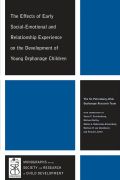
The effects of early social-emotional and relationship experience on the development of young orphan
This study represents a quasi-experimental test of the role of early socialemotional experience and adultchild relationships in the development of typically developing children and those with disabilities birth4 years of age living in orphanages in St. Petersburg, Russian Federation. Caregivers performed routine duties in a perfunctory, business-like manner with minimal interaction withchildren, and children had 912 caregivers per week and as many as 60100 different caregivers over the first 2 years of life. Orphanages were non-randomly assigned to one of two intervention or a no-intervention condition. Training staff members to engage in warm, sensitive, responsive, and developmentally appropriate interactions during routine care giving duties and altering the structure of care (e.g., higher caregiver-child ratios, stability of caregivers) were associated with substantial improvements in the development of children. Although training alone was less effective than training combined with structure changes, training alone was more effective than no intervention. These findings provide a rationale for making similar improvements in other institutions and perhaps in foster care and non-residential care environments as well and forbalancing skill building with socialemotional-relationship training in early childhood personnel preparation curricula.
- ISBN: 978-1-4051-9599-7
- Editorial: Wiley-Blackwell
- Encuadernacion: Rústica
- Páginas: 300
- Fecha Publicación: 20/02/2009
- Nº Volúmenes: 1
- Idioma: Inglés
